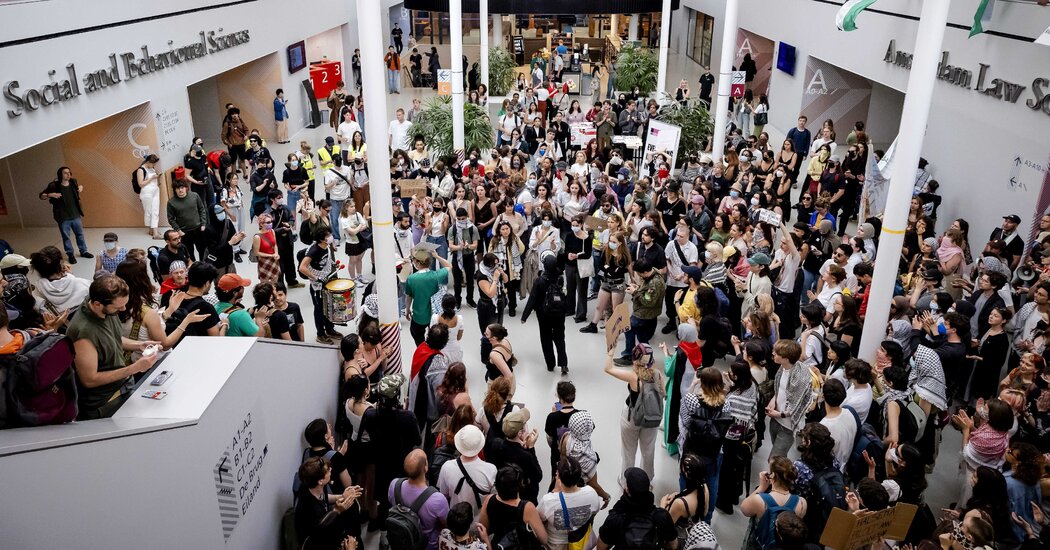Copyright The New York Times

The emails arrived a week before the conference, informing 23 Israeli academics that they were welcome to participate in a virtual meeting of the European Association of Archaeologists — but only if they hid their professional identities. “Any mention of affiliation to an Israeli institution or funding agency must be avoided,” the message from the association’s board instructed. The decision, part of a suspension of the association’s ties with Israel because of the war in Gaza, stunned Guy D. Stiebel, the chairman of the Israel Archaeological Council and longtime director of an expedition excavating the ancient fortress of Masada. “You have whitewashed your hands, soothed your conscience, and may now look in the mirror with the impression that you have done something,” Dr. Stiebel, a senior lecturer at Tel Aviv University, shot back in an angry letter to the board. “Did you stop to ask yourselves what change your decision has truly achieved?” The board, under pressure from Israel, ended up reversing its action as “rushed and misjudged” the day before the conference began, in September. But its initial response reflected widespread boycotts against Israeli universities and academics, mostly by European institutions, that grew sharply during the two-year war in Gaza and are continuing after a shaky cease-fire reached last month. Officials at European universities say the boycotts are justified because of accusations that Israel has committed genocide in Gaza made by a United Nations commission and many human rights groups. Israel denies those accusations. The European officials also say Israeli universities collaborate with the country’s defense industry. Technology from Israel’s universities “was going to be used in order to kill Palestinian people,” said Raúl Ramos, the vice rector of the University of Barcelona, explaining why his institution announced a boycott of Israeli universities and other institutions last year. He said, however, that the university would continue relationships with individual Israeli students and researchers. Israeli university officials counter that many academic institutions have been highly critical of Prime Minister Benjamin Netanyahu’s prosecution of the war. They say the boycotts amount to an effort to silence dissent. They also point out that universities in Europe and the United States collaborate with their nations’ defense industries and that Israel is being held to a different standard. “By singling out Israel, it’s ridiculous,” said Prof. Daniel Chamovitz, the president of Ben Gurion University of the Negev. “Our government sees us as the enemy,” added Professor Chamovitz, who in August called for a stop to the war and a return of the hostages at a rally in Tel Aviv. The month before, the presidents of five Israeli universities — including Hebrew University, and the Weizmann Institute of Science — sent an open letter to Mr. Netanyahu calling on him to stop the hunger crisis in Gaza. “Israeli universities are independent,” said Uri Sivan, the president of the Technion-Israel Institute of Technology, the engine behind Israel’s high tech boom and a crucial partner in its defense industry, who also signed the letter. “We’re not government universities.” The boycotts are an example of how Israel has become increasingly isolated internationally over its conduct in the war in Gaza, which was ignited by the Hamas-led attack on Israel on Oct. 7, 2023. That attack killed nearly 1,200 people, with roughly 250 people taken hostage. The resulting war, including Israel’s bombardment of Gaza, has killed more than 67,000 Palestinians, local health authorities say. The numbers do not distinguish between combatants and civilians. Outrage over Gaza has led to calls from Israel’s allies for a Palestinian state, a seismic drop in support for Israel among Americans and myriad cultural boycotts, including of Israel’s entertainment industry by some Hollywood filmmakers and actors. Mr. Nahshon, a former Israeli diplomat, said some 50 universities, institutions and academic groups in Europe ended cooperation with Israeli universities either fully or partly during the war. In a report to the Israeli Parliament in May, his task force said it had compiled more than 700 instances of academic boycotts, including total cutoffs of university-to-university collaborations, the end of student exchange programs and refusals to award Israeli academics research grants. He estimated there were now more than 1,000 such cases. The institutionwide boycotts, he said, are largely among universities in Belgium, the Netherlands, Italy and Spain. Ghent University in Belgium, considered a leader of the movement, is continuing its boycott of all Israeli universities after the Oct. 10 cease-fire. The University of Amsterdam, which suspended a student exchange program with Hebrew University in March, called the cease-fire “a glimmer of hope” but said “peace and justice cannot be achieved with a single agreement.” On Oct. 15, it announced that it would enter into no new collaborations with Israeli academic institutions. In the United States, there are no similar universitywide boycotts against Israel, although anti-Israel demonstrations erupted on American college campuses in 2024. Since then, President Trump’s pressure campaign on American universities to stamp out campus antisemitism has had what Prof. Milette Shamir, the vice president of Tel Aviv University, called “a huge healing effect.” But many protesters say their criticism of Israel’s war effort is not to be confused with antisemitism. And critics of the Trump administration say it is using antisemitism in part as an excuse to crack down on what it sees as the left-wing ideology of American elite academia. Harvard, which is in talks with the White House trying to preserve billions of dollars in federal funding, in July announced a new study abroad program with Ben Gurion University and a postdoctoral fellowship for Israeli researchers at Harvard Medical School. The announcement was made a month after the Trump administration said Harvard had violated federal civil rights law by failing to address the harassment of Jewish students and had “enabled antisemitism to fester” on campus. In Europe, Israeli academics say the boycotts, which have roots from two decades ago with the Boycott, Divestment and Sanctions movement, are also punishing Arabs because some 19 percent of university students in Israel are Israeli Arabs, who make up roughly 21 percent of the general population. Professor Chamovitz of Ben Gurion University said the boycotts were particularly painful because they felt like punishment for Israel after the Oct. 7 attacks.



